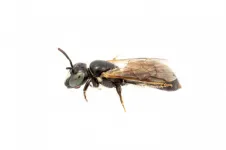(Press-News.org) URBANA, Ill. - Food waste is a major problem in the U.S., and young adults are among the worst culprits. Many of them attend college or university and live on campus, making dining halls a prime target for waste reduction efforts. And a simple intervention can make a big difference, a University of Illinois study shows.
Shifting from round to oval plates with a smaller surface area can significantly reduce food waste in dining halls, says Brenna Ellison, associate professor in the Department of Agricultural and Consumer Economics (ACE) and co-author on the study.
"Americans waste about 31% of the food that is available at the retail and consumer levels," Ellison says. "All-you-can-eat settings [common in dining halls] are extra challenging, because there's not the normal incentives to try to reduce waste on your own. When you pay a fixed amount of money to go and eat, you want to get your money's worth."
Ellison's research team previously worked with University Housing at Illinois on an educational campaign to reduce waste.
"It wasn't as successful as we expected it to be," she says. "So University Housing wanted to see if changing the plates would be a more successful way to reduce waste."
Thurman Etchison, assistant director of dining¬-facilities and equipment operations at U of I, says a 2016 waste study in campus dining halls showed about 3.3 ounces (93.5 grams) of wasted food per meal served. That amounted to 14,875 pounds (6,747 kilograms) per week across six residential dining hall locations.
"When we think about food waste in our setting, it is important to note it is not just the resources to produce the food that are wasted," Etchison says. "There is a great deal of energy, water and labor that go into the refrigeration, preparation, transportation, and serving of this food that is wasted as well. If that were not enough, there is also the wasted energy, labor, and water that go into disposing of that food. The food we waste costs us more per pound than the food that is eaten."
Ellison and co-authors Rachel Richardson, former graduate student in ACE, and Melissa Pflugh Prescott, assistant professor in the Department of Food Science and Human Nutrition, conducted the plate study in two University Housing dining halls on the U of I campus; both the round and oval plates were tested in each location, making sure to use the same menu for both plate types.
The researchers approached diners after they selected their food, and asked to take a picture of the plate and weigh the food. Diners then filled out a short survey, and when they were done eating and brought their tray to the dish return, the researchers again took a picture and weighed the remaining food.
The study included more than 1200 observations, and the researchers found significant reductions in food selection, consumption, and waste when diners used the oval plates. Overall, food waste went down from 15.8% of food selected for round plates to 11.8% for oval plates. That amounts to nearly 20 grams (0.7 oz) less food waste per plate, which adds up to a lot for a dining hall that serves thousands of meals, Ellison notes.
The researchers did not weigh plates for any diners who went back for seconds, Ellison says. They did ask diners if they went back for seconds on the survey. Using this information, they estimated the potential effects of seconds and found it would not significantly change the results.
Ellison concludes that changing plate type is a viable strategy to reduce food waste, though dining hall managers need to weigh the cost of purchasing new plates against the potential savings. Combining the direct-nudge approach of smaller plates with an education campaign may be even more effective, she notes.
INFORMATION:
The Department of Agricultural and Consumer Economics and the Department of Food Science and Human Nutrition are in the College of Agricultural, Consumer and Environmental Sciences, University of Illinois.
The paper, "Impact of plate shape and size on individual food waste in a university dining hall," is published in Resources, Conservation & Recycling. Authors include Rachel Richardson, Melissa Pflugh Prescott, and Brenna Ellison.
[https://doi.org/10.1016/j.resconrec.2020.105293]
This research was supported by funding from the National Institute of Food and Agriculture, U.S. Department of Agriculture, under award number ILLU-470-334.
West Virginia University scientists used MRI scans to show what happens when ultrasound waves target a specific area of Alzheimer's patient's brains. They concluded that this treatment may induce an immunological healing response, a potential breakthrough for a disease that accounts for up to 80% of all dementia cases.
Rashi Mehta, a researcher with the WVU School of Medicine and Rockefeller Neuroscience Institute, led the study that appears in the journal Radiology.
"Focused ultrasound is an innovative technique and new way of approaching brain diseases, including Alzheimer's disease," said Mehta, an associate professor ...
New research in mice published today in the journal Scientific Reports strengthens the growing scientific consensus regarding the role of the gut microbiome in neurodegenerative disorders including Alzheimer's disease.
The study, led by researchers at Oregon Health & Science University, found a correlation between the composition of the gut microbiome and the behavioral and cognitive performance of mice carrying genes associated with Alzheimer's. The mice carried the human amyloid precursor protein gene with dominant Alzheimer's mutations generated by scientists in Japan.
The study further suggests a relationship between microbes in the digestive tract ...
A widespread field search for a rare Australian native bee not recorded for almost a century has found it's been there all along - but is probably under increasing pressure to survive.
Only six individual were ever found, with the last published record of this Australian endemic bee species, Pharohylaeus lactiferus (Colletidae: Hylaeinae), from 1923 in Queensland.
"This is concerning because it is the only Australian species in the Pharohylaeus genus and nothing was known of its biology," Flinders University researcher James Dorey says in a new scientific paper in the journal Journal of Hymenoptera Research.
The ...
Immunologists at St. Jude Children's Research Hospital have mapped the previously unknown biological machinery by which the immune system generates T cells that kill bacteria, viruses and tumor cells.
The findings have multiple implications for how the adaptive immune system responds to infections to generate such memory T cells. The experiments revealed mechanisms that inhibit development of the long-lived memory T cells that continually renew to protect the body over time. Blocking these inhibitory mechanisms with pharmacological or genetic approaches could boost protective immunity against infection and cancers.
The researchers also discovered a subtype of memory T cells that they named terminal effector prime cells. Mapping the pathway that controls these cells raises the possibility ...
(Boston)--What if you could improve your heart health and brain function by changing your diet? Boston University School of Medicine researchers have found that by eating more plant-based food such as berries and green leafy vegetables while limiting consumption of foods high in saturated fat and animal products, you can slow down heart failure (HF) and ultimately lower your risk of cognitive decline and dementia.
Heart failure (HF) affects over 6.5 million adults in the U.S. In addition to its detrimental effects on several organ systems, presence of HF is associated with higher risk of cognitive decline and dementia. Similarly, changes in cardiac structure ...
When building a nest, previous experience raising chicks will influence the choices birds make, according to a new study by University of Alberta scientists.
The results show that birds that have successfully raised families stick with tried-and-true methods when building their nests, whereas less successful birds will try something new.
"We found that when presented with a choice between a familiar material, coconut fibre, and a never-before-encountered material, white string, zebra finches who had successfully raised chicks preferred to stick with the same material they had previously used. Birds who failed to raise chicks built nests with equal amounts of familiar and novel material," explained ...
America's stark racial disparities in health care have been exposed by COVID-19, but a new study from Michigan State University suggests that Black individuals are more likely than conservative White people to adhere to public health standards due to disparities.
The study, published in the Journal of Racial and Ethnic Health Disparities, used data from MSU's State of the State Survey that was captured during the initial COVID-19 outbreak from a representative group of 800 adults in Michigan.
"Our findings suggest that although COVID impacts all Michiganders, ...
Fiber-optic cables run underneath nearly all city grids across the United States and provide internet and cable TV to millions, but what if those systems could also provide valuable information related to hazardous events such as earthquakes and flooding? A team of researchers at Penn State have found they can do just that.
The scientists are using fiber-optic distributed acoustic sensing (DAS) technology to turn existing telecommunication infrastructure that is already installed underground into a valuable resource for monitoring ground vibrations.
"We discovered the fibers could pick up a wide variety of signal vibrations, from thunderstorms to human walking steps to music concerts," said Tieyuan Zhu, assistant professor of geophysics at Penn State and principal investigator on ...
American Geophysical Union U.S. Geological Survey Joint ReleaseWASHINGTON--Southern California can now expect to see post-wildfire landslides occurring almost every year, with major events expected roughly every ten years, a new study finds. The results show Californians are now facing a double whammy of increased wildfire and landslide risk caused by climate change-induced shifts in the state's wet and dry seasons, according to researchers who mapped landslide vulnerability in the southern half of the state.
"This is our attempt to get people thinking about where these hazards are going to be before there's even a fire," said Jason Kean, a hydrologist at the U.S. Geological Survey in Denver and lead author ...
HOUSTON - (Feb. 25, 2021) - A new theory by Rice University scientists could boost the growing field of spintronics, devices that depend on the state of an electron as much as the brute electrical force required to push it.
Materials theorist Boris Yakobson and graduate student Sunny Gupta at Rice's Brown School of Engineering describe the mechanism behind Rashba splitting, an effect seen in crystal compounds that can influence their electrons' "up" or "down" spin states, analogous to "on" or "off" in common transistors.
"Spin" is a misnomer, since quantum physics constrains electrons ...






